JSB285 Assessment: Media's Role in Political Violence & Terrorism
VerifiedAdded on 2023/06/11
|8
|2243
|129
Essay
AI Summary
This essay discusses the media's role in reporting acts of terrorism and political violence, focusing on historical media responses, the changing media landscape, and alternative reporting methods. It uses the Westminster attack as a case study, highlighting concerns about media and political authorities escalating situations. The essay argues that disproportionate attention to certain terrorist acts can favor terrorists and distort public perception. It recommends that media maintain proportionality, avoid pressuring politicians into over-reaction, and stress high-grade journalism to ensure responsible and ethical reporting. The essay concludes by emphasizing the importance of clear, unbiased reporting to prevent political manipulation and promote informed public discourse.
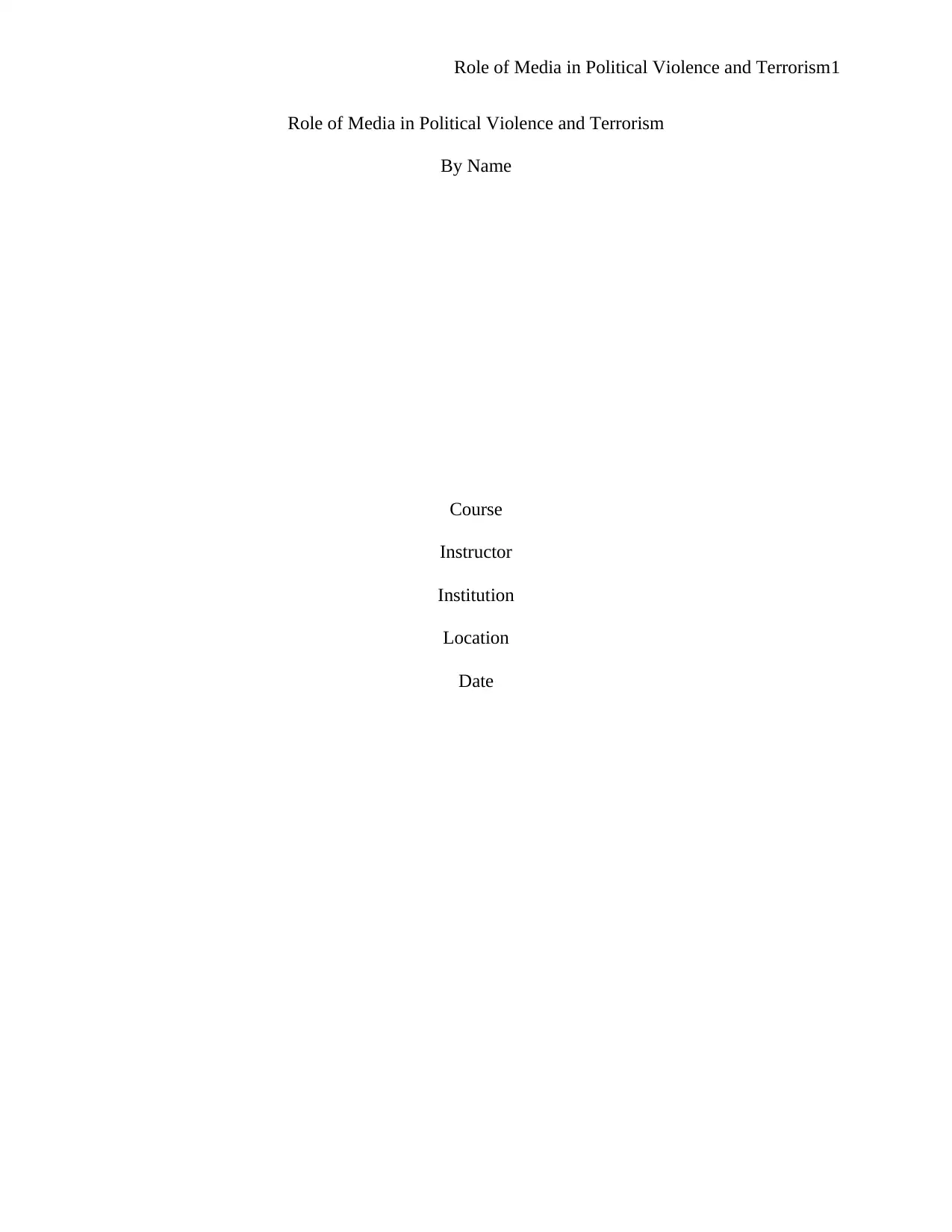
Role of Media in Political Violence and Terrorism1
Role of Media in Political Violence and Terrorism
By Name
Course
Instructor
Institution
Location
Date
Role of Media in Political Violence and Terrorism
By Name
Course
Instructor
Institution
Location
Date
Paraphrase This Document
Need a fresh take? Get an instant paraphrase of this document with our AI Paraphraser
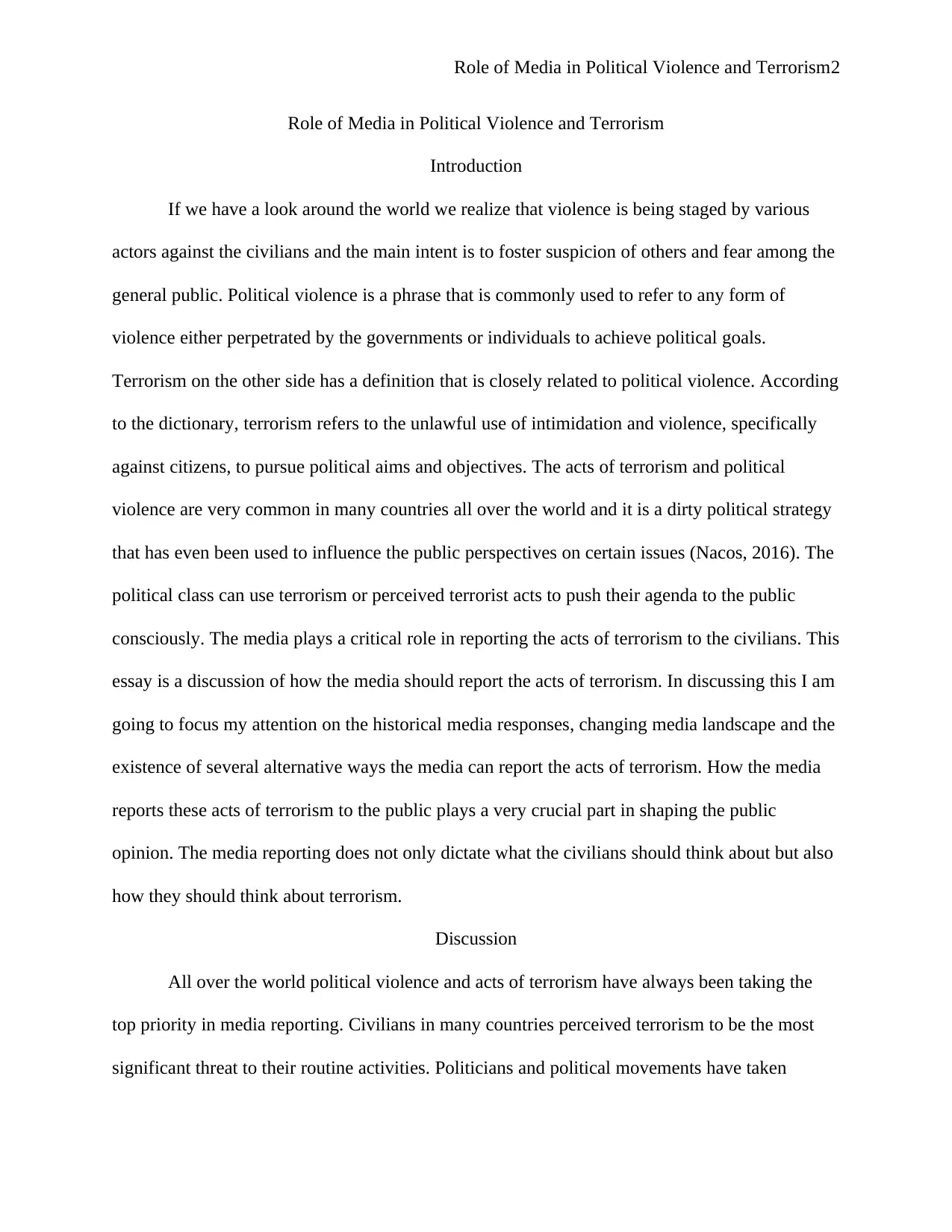
Role of Media in Political Violence and Terrorism2
Role of Media in Political Violence and Terrorism
Introduction
If we have a look around the world we realize that violence is being staged by various
actors against the civilians and the main intent is to foster suspicion of others and fear among the
general public. Political violence is a phrase that is commonly used to refer to any form of
violence either perpetrated by the governments or individuals to achieve political goals.
Terrorism on the other side has a definition that is closely related to political violence. According
to the dictionary, terrorism refers to the unlawful use of intimidation and violence, specifically
against citizens, to pursue political aims and objectives. The acts of terrorism and political
violence are very common in many countries all over the world and it is a dirty political strategy
that has even been used to influence the public perspectives on certain issues (Nacos, 2016). The
political class can use terrorism or perceived terrorist acts to push their agenda to the public
consciously. The media plays a critical role in reporting the acts of terrorism to the civilians. This
essay is a discussion of how the media should report the acts of terrorism. In discussing this I am
going to focus my attention on the historical media responses, changing media landscape and the
existence of several alternative ways the media can report the acts of terrorism. How the media
reports these acts of terrorism to the public plays a very crucial part in shaping the public
opinion. The media reporting does not only dictate what the civilians should think about but also
how they should think about terrorism.
Discussion
All over the world political violence and acts of terrorism have always been taking the
top priority in media reporting. Civilians in many countries perceived terrorism to be the most
significant threat to their routine activities. Politicians and political movements have taken
Role of Media in Political Violence and Terrorism
Introduction
If we have a look around the world we realize that violence is being staged by various
actors against the civilians and the main intent is to foster suspicion of others and fear among the
general public. Political violence is a phrase that is commonly used to refer to any form of
violence either perpetrated by the governments or individuals to achieve political goals.
Terrorism on the other side has a definition that is closely related to political violence. According
to the dictionary, terrorism refers to the unlawful use of intimidation and violence, specifically
against citizens, to pursue political aims and objectives. The acts of terrorism and political
violence are very common in many countries all over the world and it is a dirty political strategy
that has even been used to influence the public perspectives on certain issues (Nacos, 2016). The
political class can use terrorism or perceived terrorist acts to push their agenda to the public
consciously. The media plays a critical role in reporting the acts of terrorism to the civilians. This
essay is a discussion of how the media should report the acts of terrorism. In discussing this I am
going to focus my attention on the historical media responses, changing media landscape and the
existence of several alternative ways the media can report the acts of terrorism. How the media
reports these acts of terrorism to the public plays a very crucial part in shaping the public
opinion. The media reporting does not only dictate what the civilians should think about but also
how they should think about terrorism.
Discussion
All over the world political violence and acts of terrorism have always been taking the
top priority in media reporting. Civilians in many countries perceived terrorism to be the most
significant threat to their routine activities. Politicians and political movements have taken
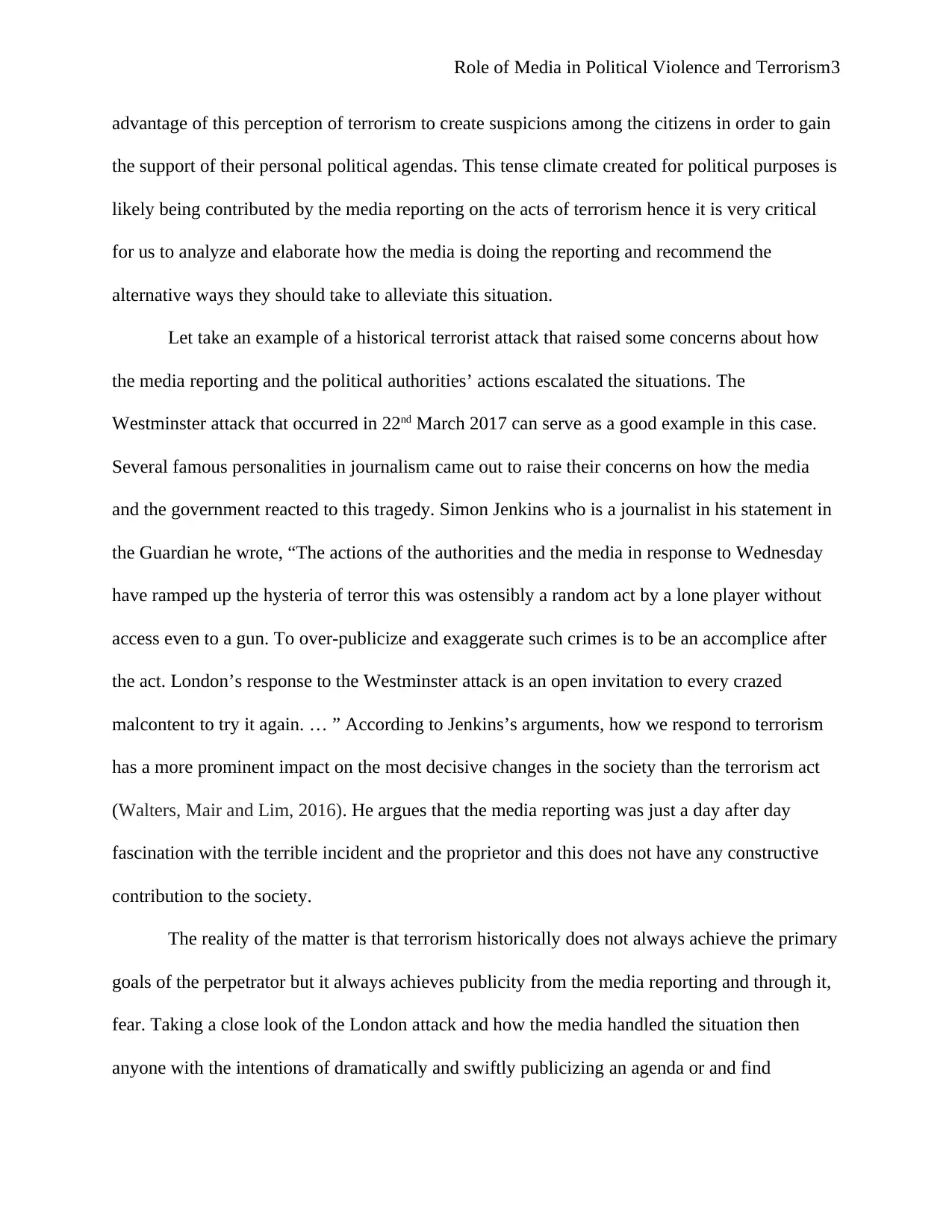
Role of Media in Political Violence and Terrorism3
advantage of this perception of terrorism to create suspicions among the citizens in order to gain
the support of their personal political agendas. This tense climate created for political purposes is
likely being contributed by the media reporting on the acts of terrorism hence it is very critical
for us to analyze and elaborate how the media is doing the reporting and recommend the
alternative ways they should take to alleviate this situation.
Let take an example of a historical terrorist attack that raised some concerns about how
the media reporting and the political authorities’ actions escalated the situations. The
Westminster attack that occurred in 22nd March 2017 can serve as a good example in this case.
Several famous personalities in journalism came out to raise their concerns on how the media
and the government reacted to this tragedy. Simon Jenkins who is a journalist in his statement in
the Guardian he wrote, “The actions of the authorities and the media in response to Wednesday
have ramped up the hysteria of terror this was ostensibly a random act by a lone player without
access even to a gun. To over-publicize and exaggerate such crimes is to be an accomplice after
the act. London’s response to the Westminster attack is an open invitation to every crazed
malcontent to try it again. … ” According to Jenkins’s arguments, how we respond to terrorism
has a more prominent impact on the most decisive changes in the society than the terrorism act
(Walters, Mair and Lim, 2016). He argues that the media reporting was just a day after day
fascination with the terrible incident and the proprietor and this does not have any constructive
contribution to the society.
The reality of the matter is that terrorism historically does not always achieve the primary
goals of the perpetrator but it always achieves publicity from the media reporting and through it,
fear. Taking a close look of the London attack and how the media handled the situation then
anyone with the intentions of dramatically and swiftly publicizing an agenda or and find
advantage of this perception of terrorism to create suspicions among the citizens in order to gain
the support of their personal political agendas. This tense climate created for political purposes is
likely being contributed by the media reporting on the acts of terrorism hence it is very critical
for us to analyze and elaborate how the media is doing the reporting and recommend the
alternative ways they should take to alleviate this situation.
Let take an example of a historical terrorist attack that raised some concerns about how
the media reporting and the political authorities’ actions escalated the situations. The
Westminster attack that occurred in 22nd March 2017 can serve as a good example in this case.
Several famous personalities in journalism came out to raise their concerns on how the media
and the government reacted to this tragedy. Simon Jenkins who is a journalist in his statement in
the Guardian he wrote, “The actions of the authorities and the media in response to Wednesday
have ramped up the hysteria of terror this was ostensibly a random act by a lone player without
access even to a gun. To over-publicize and exaggerate such crimes is to be an accomplice after
the act. London’s response to the Westminster attack is an open invitation to every crazed
malcontent to try it again. … ” According to Jenkins’s arguments, how we respond to terrorism
has a more prominent impact on the most decisive changes in the society than the terrorism act
(Walters, Mair and Lim, 2016). He argues that the media reporting was just a day after day
fascination with the terrible incident and the proprietor and this does not have any constructive
contribution to the society.
The reality of the matter is that terrorism historically does not always achieve the primary
goals of the perpetrator but it always achieves publicity from the media reporting and through it,
fear. Taking a close look of the London attack and how the media handled the situation then
anyone with the intentions of dramatically and swiftly publicizing an agenda or and find
⊘ This is a preview!⊘
Do you want full access?
Subscribe today to unlock all pages.

Trusted by 1+ million students worldwide
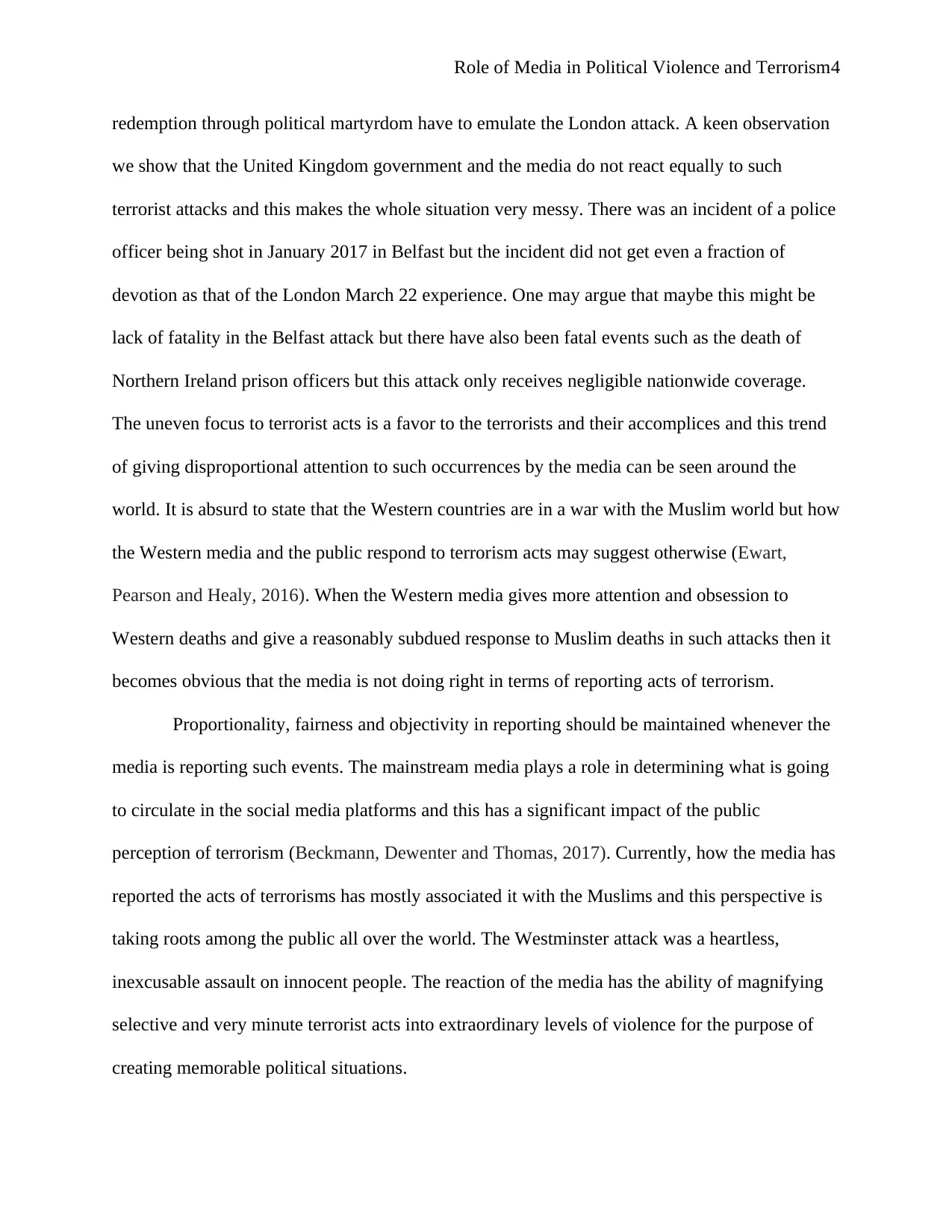
Role of Media in Political Violence and Terrorism4
redemption through political martyrdom have to emulate the London attack. A keen observation
we show that the United Kingdom government and the media do not react equally to such
terrorist attacks and this makes the whole situation very messy. There was an incident of a police
officer being shot in January 2017 in Belfast but the incident did not get even a fraction of
devotion as that of the London March 22 experience. One may argue that maybe this might be
lack of fatality in the Belfast attack but there have also been fatal events such as the death of
Northern Ireland prison officers but this attack only receives negligible nationwide coverage.
The uneven focus to terrorist acts is a favor to the terrorists and their accomplices and this trend
of giving disproportional attention to such occurrences by the media can be seen around the
world. It is absurd to state that the Western countries are in a war with the Muslim world but how
the Western media and the public respond to terrorism acts may suggest otherwise (Ewart,
Pearson and Healy, 2016). When the Western media gives more attention and obsession to
Western deaths and give a reasonably subdued response to Muslim deaths in such attacks then it
becomes obvious that the media is not doing right in terms of reporting acts of terrorism.
Proportionality, fairness and objectivity in reporting should be maintained whenever the
media is reporting such events. The mainstream media plays a role in determining what is going
to circulate in the social media platforms and this has a significant impact of the public
perception of terrorism (Beckmann, Dewenter and Thomas, 2017). Currently, how the media has
reported the acts of terrorisms has mostly associated it with the Muslims and this perspective is
taking roots among the public all over the world. The Westminster attack was a heartless,
inexcusable assault on innocent people. The reaction of the media has the ability of magnifying
selective and very minute terrorist acts into extraordinary levels of violence for the purpose of
creating memorable political situations.
redemption through political martyrdom have to emulate the London attack. A keen observation
we show that the United Kingdom government and the media do not react equally to such
terrorist attacks and this makes the whole situation very messy. There was an incident of a police
officer being shot in January 2017 in Belfast but the incident did not get even a fraction of
devotion as that of the London March 22 experience. One may argue that maybe this might be
lack of fatality in the Belfast attack but there have also been fatal events such as the death of
Northern Ireland prison officers but this attack only receives negligible nationwide coverage.
The uneven focus to terrorist acts is a favor to the terrorists and their accomplices and this trend
of giving disproportional attention to such occurrences by the media can be seen around the
world. It is absurd to state that the Western countries are in a war with the Muslim world but how
the Western media and the public respond to terrorism acts may suggest otherwise (Ewart,
Pearson and Healy, 2016). When the Western media gives more attention and obsession to
Western deaths and give a reasonably subdued response to Muslim deaths in such attacks then it
becomes obvious that the media is not doing right in terms of reporting acts of terrorism.
Proportionality, fairness and objectivity in reporting should be maintained whenever the
media is reporting such events. The mainstream media plays a role in determining what is going
to circulate in the social media platforms and this has a significant impact of the public
perception of terrorism (Beckmann, Dewenter and Thomas, 2017). Currently, how the media has
reported the acts of terrorisms has mostly associated it with the Muslims and this perspective is
taking roots among the public all over the world. The Westminster attack was a heartless,
inexcusable assault on innocent people. The reaction of the media has the ability of magnifying
selective and very minute terrorist acts into extraordinary levels of violence for the purpose of
creating memorable political situations.
Paraphrase This Document
Need a fresh take? Get an instant paraphrase of this document with our AI Paraphraser
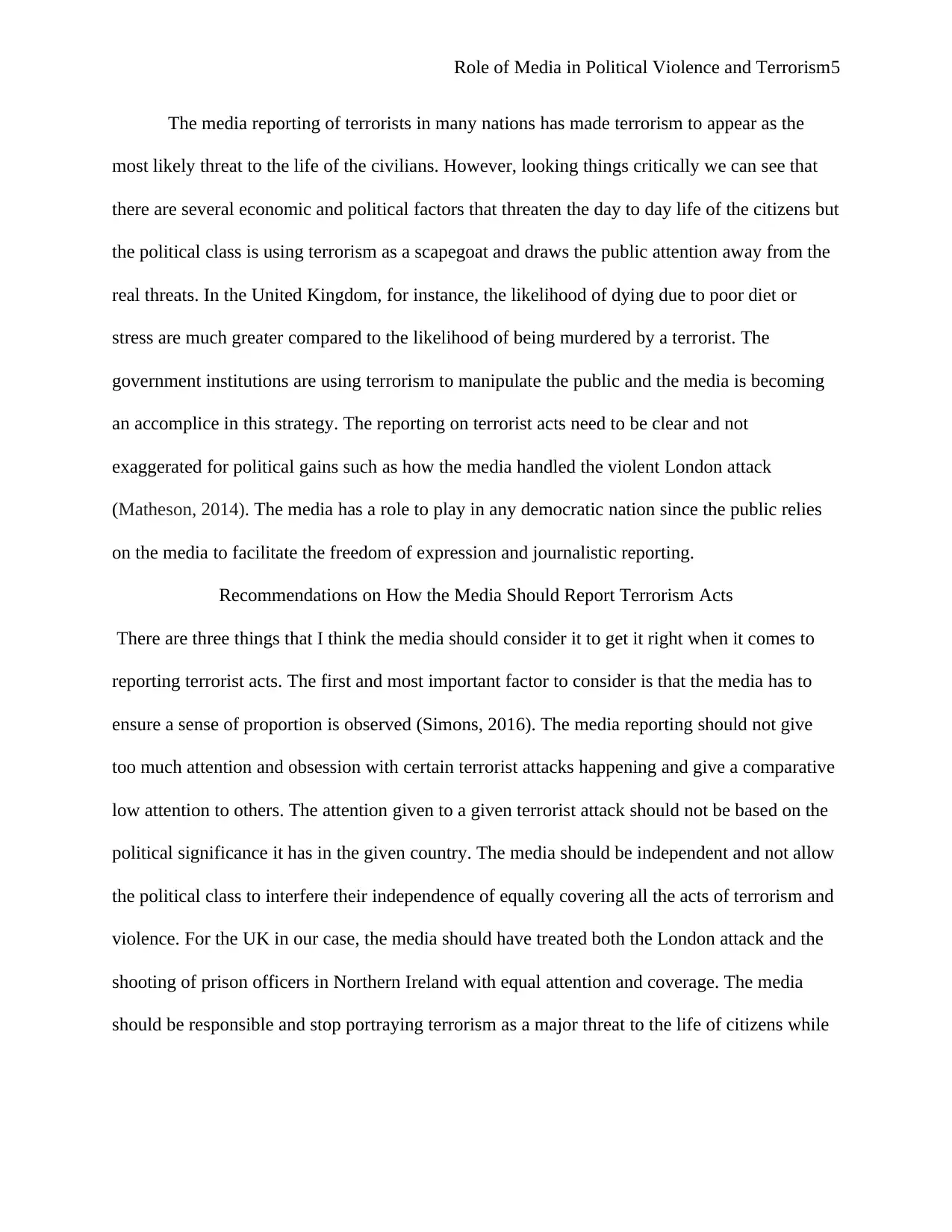
Role of Media in Political Violence and Terrorism5
The media reporting of terrorists in many nations has made terrorism to appear as the
most likely threat to the life of the civilians. However, looking things critically we can see that
there are several economic and political factors that threaten the day to day life of the citizens but
the political class is using terrorism as a scapegoat and draws the public attention away from the
real threats. In the United Kingdom, for instance, the likelihood of dying due to poor diet or
stress are much greater compared to the likelihood of being murdered by a terrorist. The
government institutions are using terrorism to manipulate the public and the media is becoming
an accomplice in this strategy. The reporting on terrorist acts need to be clear and not
exaggerated for political gains such as how the media handled the violent London attack
(Matheson, 2014). The media has a role to play in any democratic nation since the public relies
on the media to facilitate the freedom of expression and journalistic reporting.
Recommendations on How the Media Should Report Terrorism Acts
There are three things that I think the media should consider it to get it right when it comes to
reporting terrorist acts. The first and most important factor to consider is that the media has to
ensure a sense of proportion is observed (Simons, 2016). The media reporting should not give
too much attention and obsession with certain terrorist attacks happening and give a comparative
low attention to others. The attention given to a given terrorist attack should not be based on the
political significance it has in the given country. The media should be independent and not allow
the political class to interfere their independence of equally covering all the acts of terrorism and
violence. For the UK in our case, the media should have treated both the London attack and the
shooting of prison officers in Northern Ireland with equal attention and coverage. The media
should be responsible and stop portraying terrorism as a major threat to the life of citizens while
The media reporting of terrorists in many nations has made terrorism to appear as the
most likely threat to the life of the civilians. However, looking things critically we can see that
there are several economic and political factors that threaten the day to day life of the citizens but
the political class is using terrorism as a scapegoat and draws the public attention away from the
real threats. In the United Kingdom, for instance, the likelihood of dying due to poor diet or
stress are much greater compared to the likelihood of being murdered by a terrorist. The
government institutions are using terrorism to manipulate the public and the media is becoming
an accomplice in this strategy. The reporting on terrorist acts need to be clear and not
exaggerated for political gains such as how the media handled the violent London attack
(Matheson, 2014). The media has a role to play in any democratic nation since the public relies
on the media to facilitate the freedom of expression and journalistic reporting.
Recommendations on How the Media Should Report Terrorism Acts
There are three things that I think the media should consider it to get it right when it comes to
reporting terrorist acts. The first and most important factor to consider is that the media has to
ensure a sense of proportion is observed (Simons, 2016). The media reporting should not give
too much attention and obsession with certain terrorist attacks happening and give a comparative
low attention to others. The attention given to a given terrorist attack should not be based on the
political significance it has in the given country. The media should be independent and not allow
the political class to interfere their independence of equally covering all the acts of terrorism and
violence. For the UK in our case, the media should have treated both the London attack and the
shooting of prison officers in Northern Ireland with equal attention and coverage. The media
should be responsible and stop portraying terrorism as a major threat to the life of citizens while
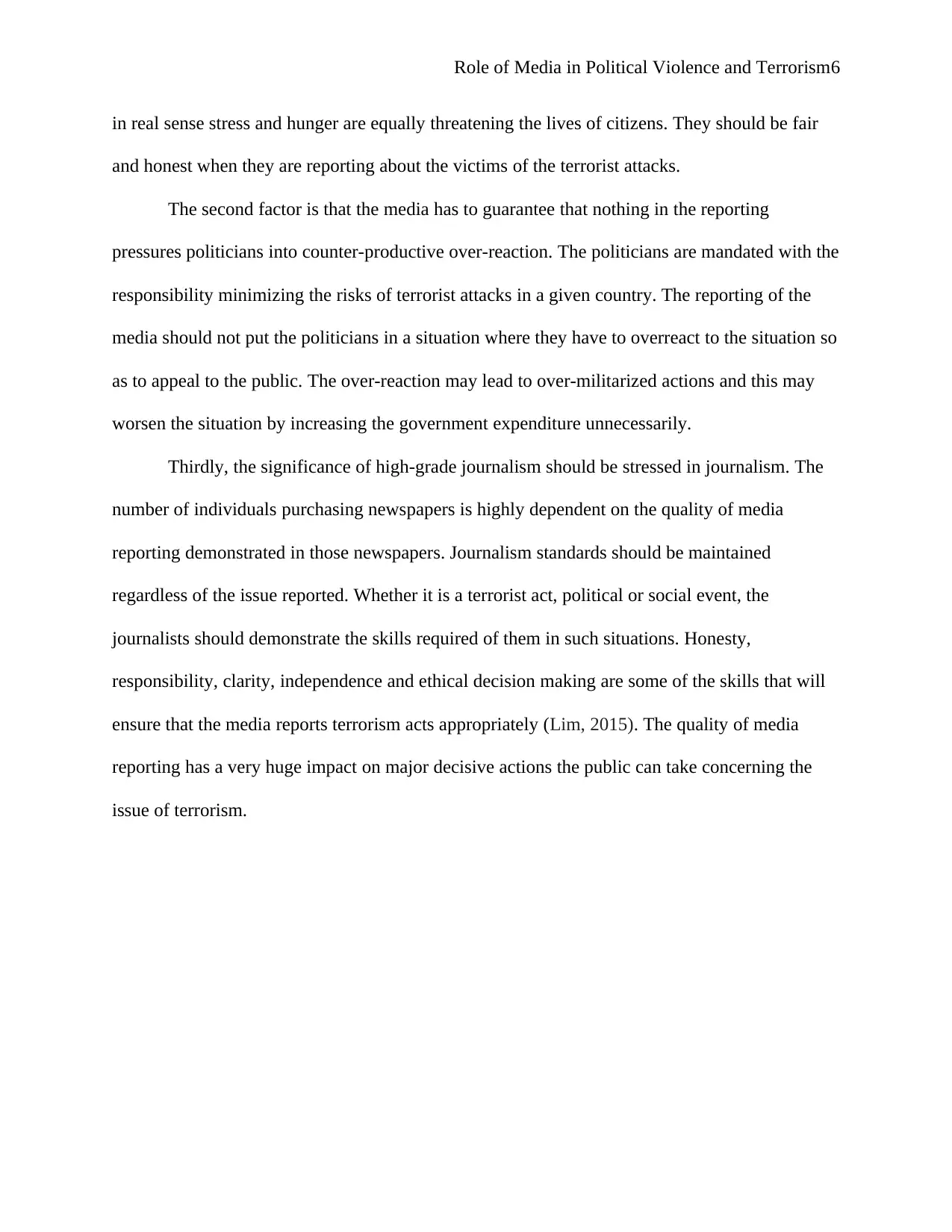
Role of Media in Political Violence and Terrorism6
in real sense stress and hunger are equally threatening the lives of citizens. They should be fair
and honest when they are reporting about the victims of the terrorist attacks.
The second factor is that the media has to guarantee that nothing in the reporting
pressures politicians into counter-productive over-reaction. The politicians are mandated with the
responsibility minimizing the risks of terrorist attacks in a given country. The reporting of the
media should not put the politicians in a situation where they have to overreact to the situation so
as to appeal to the public. The over-reaction may lead to over-militarized actions and this may
worsen the situation by increasing the government expenditure unnecessarily.
Thirdly, the significance of high-grade journalism should be stressed in journalism. The
number of individuals purchasing newspapers is highly dependent on the quality of media
reporting demonstrated in those newspapers. Journalism standards should be maintained
regardless of the issue reported. Whether it is a terrorist act, political or social event, the
journalists should demonstrate the skills required of them in such situations. Honesty,
responsibility, clarity, independence and ethical decision making are some of the skills that will
ensure that the media reports terrorism acts appropriately (Lim, 2015). The quality of media
reporting has a very huge impact on major decisive actions the public can take concerning the
issue of terrorism.
in real sense stress and hunger are equally threatening the lives of citizens. They should be fair
and honest when they are reporting about the victims of the terrorist attacks.
The second factor is that the media has to guarantee that nothing in the reporting
pressures politicians into counter-productive over-reaction. The politicians are mandated with the
responsibility minimizing the risks of terrorist attacks in a given country. The reporting of the
media should not put the politicians in a situation where they have to overreact to the situation so
as to appeal to the public. The over-reaction may lead to over-militarized actions and this may
worsen the situation by increasing the government expenditure unnecessarily.
Thirdly, the significance of high-grade journalism should be stressed in journalism. The
number of individuals purchasing newspapers is highly dependent on the quality of media
reporting demonstrated in those newspapers. Journalism standards should be maintained
regardless of the issue reported. Whether it is a terrorist act, political or social event, the
journalists should demonstrate the skills required of them in such situations. Honesty,
responsibility, clarity, independence and ethical decision making are some of the skills that will
ensure that the media reports terrorism acts appropriately (Lim, 2015). The quality of media
reporting has a very huge impact on major decisive actions the public can take concerning the
issue of terrorism.
⊘ This is a preview!⊘
Do you want full access?
Subscribe today to unlock all pages.

Trusted by 1+ million students worldwide
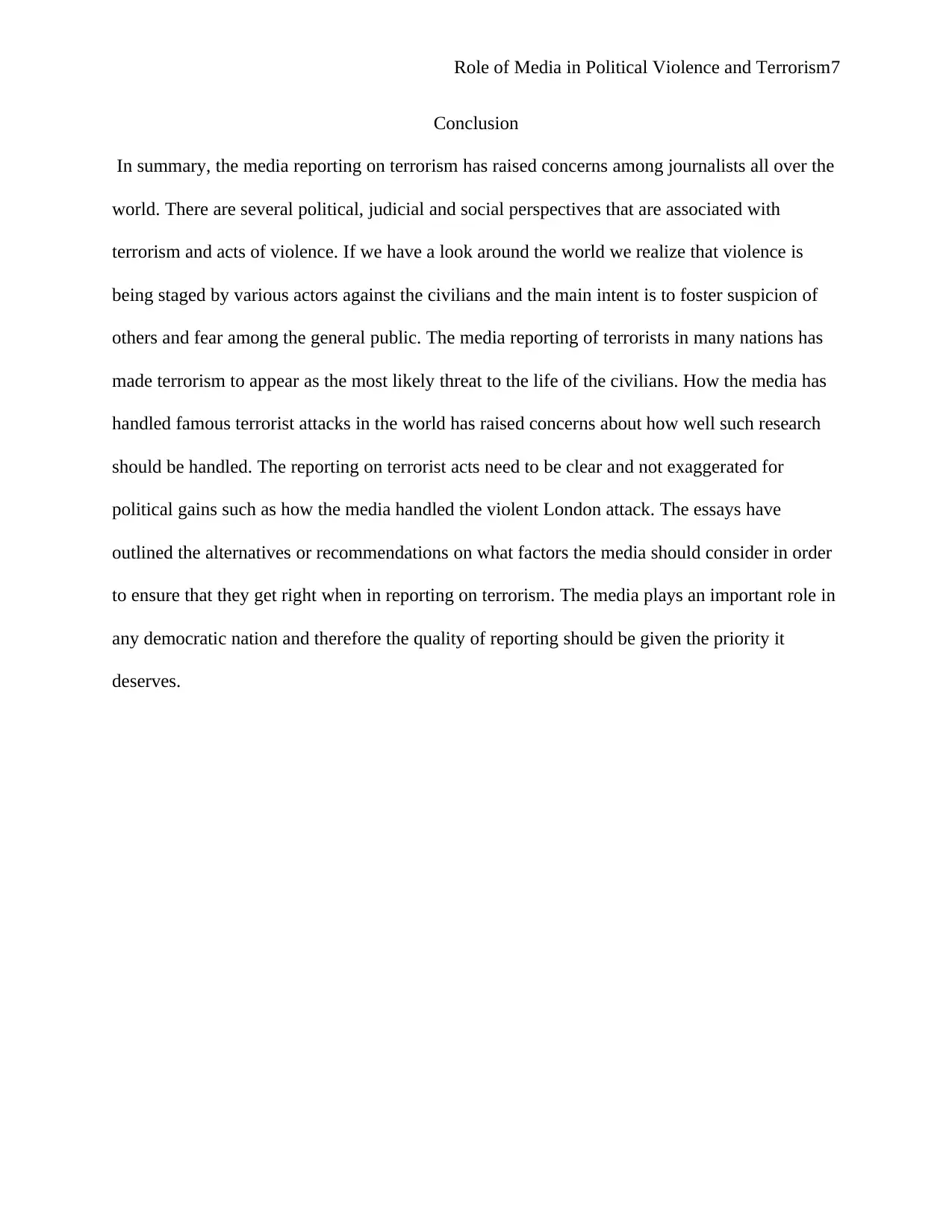
Role of Media in Political Violence and Terrorism7
Conclusion
In summary, the media reporting on terrorism has raised concerns among journalists all over the
world. There are several political, judicial and social perspectives that are associated with
terrorism and acts of violence. If we have a look around the world we realize that violence is
being staged by various actors against the civilians and the main intent is to foster suspicion of
others and fear among the general public. The media reporting of terrorists in many nations has
made terrorism to appear as the most likely threat to the life of the civilians. How the media has
handled famous terrorist attacks in the world has raised concerns about how well such research
should be handled. The reporting on terrorist acts need to be clear and not exaggerated for
political gains such as how the media handled the violent London attack. The essays have
outlined the alternatives or recommendations on what factors the media should consider in order
to ensure that they get right when in reporting on terrorism. The media plays an important role in
any democratic nation and therefore the quality of reporting should be given the priority it
deserves.
Conclusion
In summary, the media reporting on terrorism has raised concerns among journalists all over the
world. There are several political, judicial and social perspectives that are associated with
terrorism and acts of violence. If we have a look around the world we realize that violence is
being staged by various actors against the civilians and the main intent is to foster suspicion of
others and fear among the general public. The media reporting of terrorists in many nations has
made terrorism to appear as the most likely threat to the life of the civilians. How the media has
handled famous terrorist attacks in the world has raised concerns about how well such research
should be handled. The reporting on terrorist acts need to be clear and not exaggerated for
political gains such as how the media handled the violent London attack. The essays have
outlined the alternatives or recommendations on what factors the media should consider in order
to ensure that they get right when in reporting on terrorism. The media plays an important role in
any democratic nation and therefore the quality of reporting should be given the priority it
deserves.
Paraphrase This Document
Need a fresh take? Get an instant paraphrase of this document with our AI Paraphraser
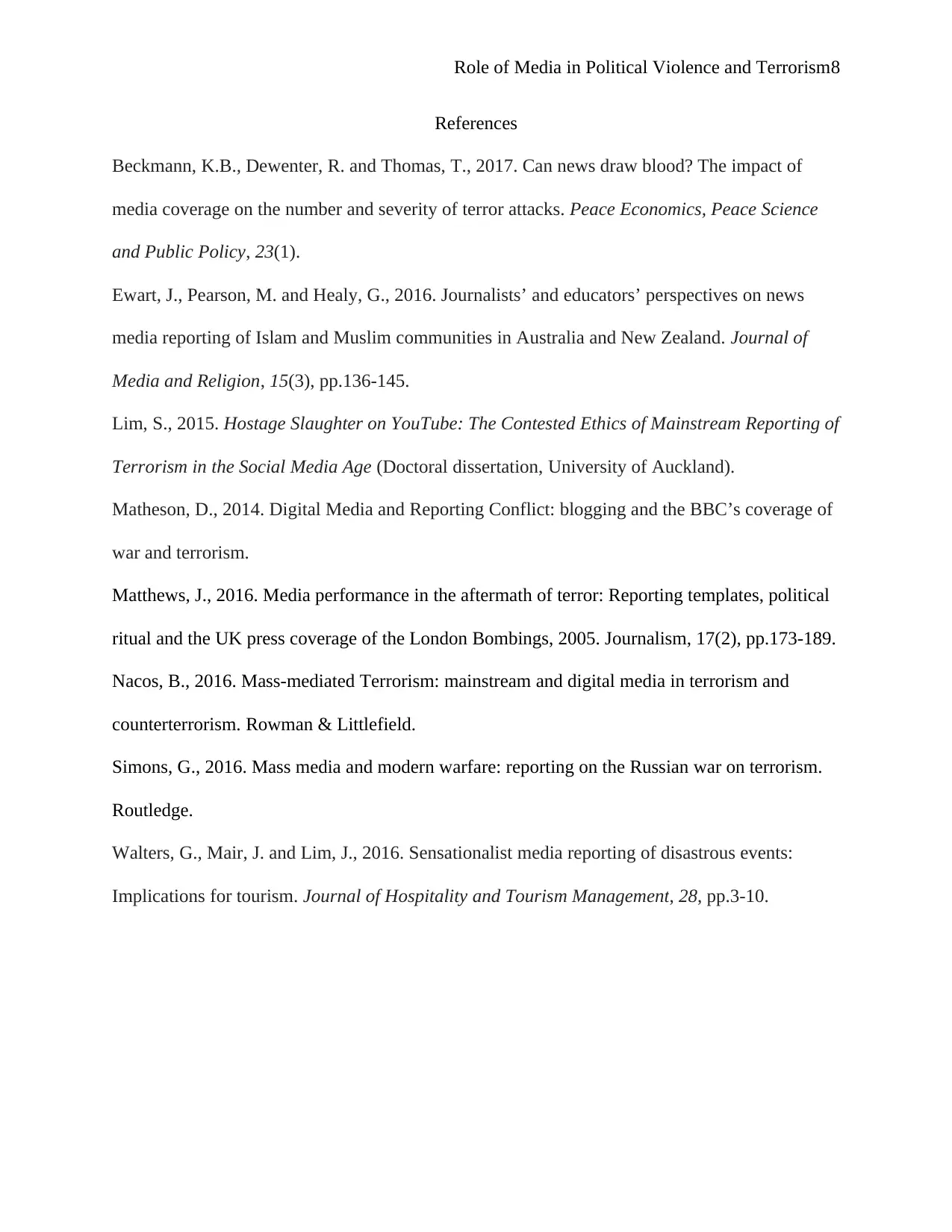
Role of Media in Political Violence and Terrorism8
References
Beckmann, K.B., Dewenter, R. and Thomas, T., 2017. Can news draw blood? The impact of
media coverage on the number and severity of terror attacks. Peace Economics, Peace Science
and Public Policy, 23(1).
Ewart, J., Pearson, M. and Healy, G., 2016. Journalists’ and educators’ perspectives on news
media reporting of Islam and Muslim communities in Australia and New Zealand. Journal of
Media and Religion, 15(3), pp.136-145.
Lim, S., 2015. Hostage Slaughter on YouTube: The Contested Ethics of Mainstream Reporting of
Terrorism in the Social Media Age (Doctoral dissertation, University of Auckland).
Matheson, D., 2014. Digital Media and Reporting Conflict: blogging and the BBC’s coverage of
war and terrorism.
Matthews, J., 2016. Media performance in the aftermath of terror: Reporting templates, political
ritual and the UK press coverage of the London Bombings, 2005. Journalism, 17(2), pp.173-189.
Nacos, B., 2016. Mass-mediated Terrorism: mainstream and digital media in terrorism and
counterterrorism. Rowman & Littlefield.
Simons, G., 2016. Mass media and modern warfare: reporting on the Russian war on terrorism.
Routledge.
Walters, G., Mair, J. and Lim, J., 2016. Sensationalist media reporting of disastrous events:
Implications for tourism. Journal of Hospitality and Tourism Management, 28, pp.3-10.
References
Beckmann, K.B., Dewenter, R. and Thomas, T., 2017. Can news draw blood? The impact of
media coverage on the number and severity of terror attacks. Peace Economics, Peace Science
and Public Policy, 23(1).
Ewart, J., Pearson, M. and Healy, G., 2016. Journalists’ and educators’ perspectives on news
media reporting of Islam and Muslim communities in Australia and New Zealand. Journal of
Media and Religion, 15(3), pp.136-145.
Lim, S., 2015. Hostage Slaughter on YouTube: The Contested Ethics of Mainstream Reporting of
Terrorism in the Social Media Age (Doctoral dissertation, University of Auckland).
Matheson, D., 2014. Digital Media and Reporting Conflict: blogging and the BBC’s coverage of
war and terrorism.
Matthews, J., 2016. Media performance in the aftermath of terror: Reporting templates, political
ritual and the UK press coverage of the London Bombings, 2005. Journalism, 17(2), pp.173-189.
Nacos, B., 2016. Mass-mediated Terrorism: mainstream and digital media in terrorism and
counterterrorism. Rowman & Littlefield.
Simons, G., 2016. Mass media and modern warfare: reporting on the Russian war on terrorism.
Routledge.
Walters, G., Mair, J. and Lim, J., 2016. Sensationalist media reporting of disastrous events:
Implications for tourism. Journal of Hospitality and Tourism Management, 28, pp.3-10.
1 out of 8
Related Documents
Your All-in-One AI-Powered Toolkit for Academic Success.
+13062052269
info@desklib.com
Available 24*7 on WhatsApp / Email
![[object Object]](/_next/static/media/star-bottom.7253800d.svg)
Unlock your academic potential
Copyright © 2020–2025 A2Z Services. All Rights Reserved. Developed and managed by ZUCOL.





